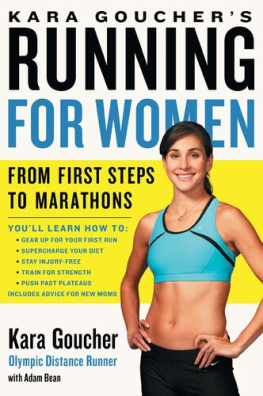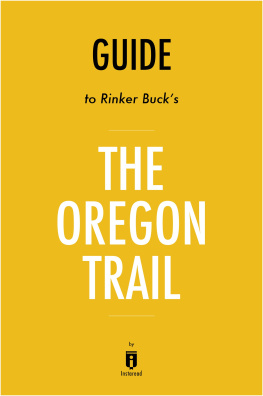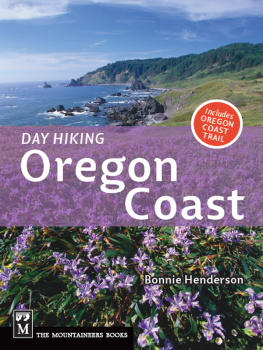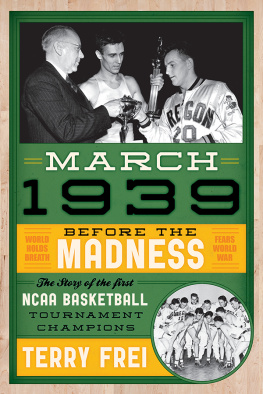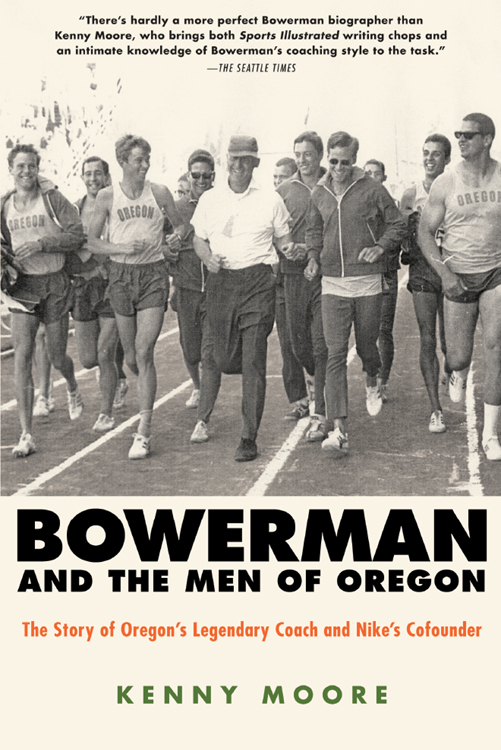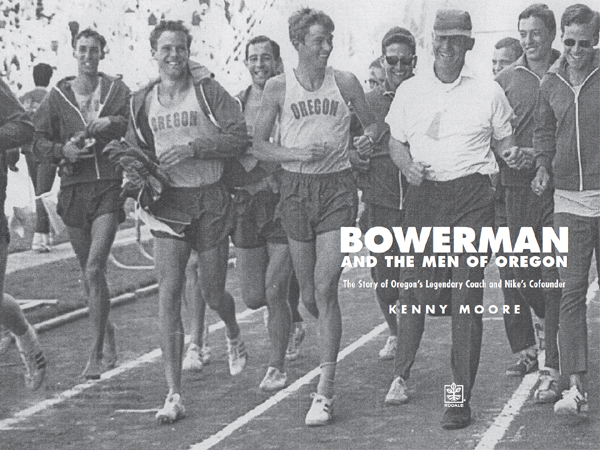
Bill does a victory lap with the team after the 1967 PAC-8 Championships in Eugene. Photo by ROGER JENSEN
N O T I C E
Mention of specific companies, organizations, or authorities in this book does not imply endorsement by the publisher, nor does mention of specific companies, organizations, or authorities imply that they endorse this book.
2006 by Kenny Moore
All rights reserved. No part of this publication may be reproduced or transmitted in any form or by any means, electronic or mechanical, including photocopying, recording, or any other information storage and retrieval system, without the written permission of the publisher.
BOOK DESIGN BY Susan P. Eugster
Library of Congress Cataloging-in-Publication Data
Moore, Kenny
Bowerman and the men of Oregon : the story of Oregons legendary coach and Nikes cofounder / Kenny Moore.
p. cm.
Includes index.
ISBN-13 9781594861901 hardcover
ISBN-10 1594861900 hardcover
ISBN-13 9781594867316 paperback
ISBN-10 1594867313 paperback
e-ISBN-13 9781609616267
1. Bowerman, William J. 2. Track and field coachesUnited StatesBiography. 3. University of OregonTrack and field. 4. Nike (Firm)History. I. Title.
GV697.B68M66 2006
796.42092dc22 2005035749
Distributed to the book trade by Holtzbrinck Publishers
2 4 6 8 10 9 7 5 3 1 hardcover
2 4 6 8 10 9 7 5 3 1 paperback

We inspire and enable people to improve their lives and the world around them
For more of our products vist rodalestore.com or call 800-848-4735
To my three great mentors,
Oregon track coach Bill Bowerman,
Sports Illustrated managing editor Gilbert Rogin,
and Oscar-winning screenwriter Robert Towne,
whose iron standards infuse these pages
CONTENTS
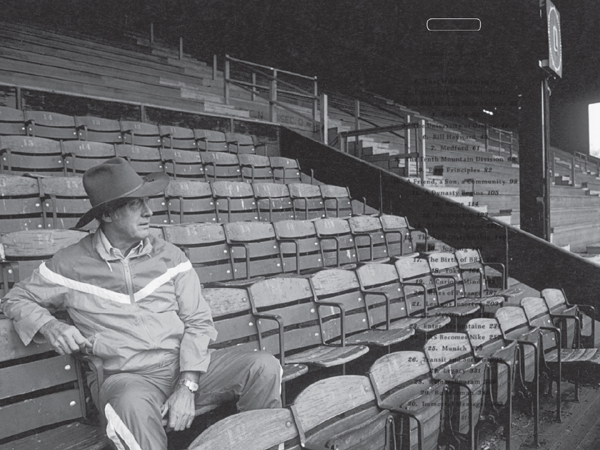
Bill sits in the Presidents Box, Hayward Fields east stands, where he often called team meetings. Photo by BRIAN LANKER
Acknowledgments
ONE OF BILL BOWERMANS STERNEST COMMANDMENTS WAS TO GIVE CREDIT where credit is due. If I obeyed completely, this note would take up half the book because writing it required the help of hundredsa magnificent, trusting relay teamto carry this endeavor to conclusion. The following few are those without whom the book simply would have been impossible:
Bill Landers, who first gained Bill Bowermans permission to proceed on his biography and taped days of memories from Bill and his family, friends, enemies, colleagues, and athletes. Landerss knowledge of Bowermans life and character guided each chapter from an unwieldy mess to a clear stage on an epic journey.
Heidi Rodale, who was drawn into the Bowerman story when her runner son Alex was inspired by Steve Prefontainean abiding personal connection that enabled her to be the best publisher possible.
The Bowerman family. Bills sons Jon, Jay, and Tom patiently answered every question with well-supported history, documents, and lengthy personal accounts. Barbara Bowerman bravely went back through her seventy years with Bill with the zeal of a detective-psychologist. I will always recall her at age ninety, ordering me to stay behind the wheel while she jumped out to swing open every cattle gate crossing on the ranch roads around Fossil, Oregon.
Jeff Johnson, who gave Nike its name. Jeff willed himself back from a stroke to go over every page for accuracy. Reading this book, he reports, saved my life. He returned the favor with extraordinary insights into Nikes formation and growth.
Contract editor Roberta Conlan, who first met Bill Bowerman in 1968. Bobbie applied her gifted editorial mind with professional rigor, doggedly overseeing my transit from good intentions to credible, weight-bearing sentences.
James Fox, the spirited head of Special Collections and University Archives at the University of Oregons Knight Library, and his astute team of curators: Linda Long, Heather Briston, Leslie Larson, Bruce Tabb, Normandy Helmer, Marilyn Reaves, and Melissa Anderson. All were a striking blend of energy and mindfulness as they helped me and assistant Connie Johnston review the huge volume of papers Bowerman assigned to the Library. Among the 35 boxes in the collection, many books and dissertations remain to be written about Bill Bowerman. James Fox and company stand ready to point the way for future authors.
Faithful friends Jim and Mary Jaqua, Ron and Mary Beth Seiple, Kip Leonard and Jody Miller, Josh and Nancy Reckord. Their leaping into every breech kept the project rolling through torrential rains and mounting, unplanned years.
Finally, my apologies to dozens of Men of Oregon (Jim Grelle, Dave Steen, Jere Van Dyk, Vic Reeve, Archie San Romani, and Dick Miller spring to mind.) for having to dilute the humor, pace, and detail of their stories by mashing them into the confines of these few pages.
Kenny Moore
November 15, 2005
INTRODUCTION
Men of Oregon
A guru gives us himself and then his system; a teacher gives us his subject, and then ourselves.
ADAM GOPNIK
IN THE SPRING OF 1964, BILL BOWERMAN GAVE ME HIS SUBJECT AND STOOD back to see if I deserved it. Bowerman, then fifty-three, had coached six sub-four-minute milers at the University of Oregon and had won the 1962 NCAA Track and Field championship on the very field where he now stood, signaling me over. I was twenty, a sophomore two-miler, just finishing my first training run after being out with the flu. He put two fingers to my neck, taking my pulse from my carotid artery.
Easy day? he asked.
Easy day. Absolutely.
Twelve miles? As if he were my physician, he tilted my head back so he could look me in the eye. He was six feet two and over 200 pounds, with a powerful upper body.
An easy twelve, I said.
We had vexed each other that year. I had never won a race in high school, had never broken 9:15 for two miles, but was determined to run the 100 miles a week his good friend Arthur Lydiard assigned his New Zealand Olympic champions.
Are you in this simply to do mindless labor, he said, or do you want to improve?
To improve.
You cant improve if youre always sick or injured.
I know, but Bill, it was an easy twel...
He closed great, calloused hands around my throat. He did not lift me off the ground. He did relieve my feet of much of their burden. He brought my forehead to his. Im going to ask you to take part in an experiment, he said with menacing calm. People five yards away thought we were sharing a tidbit of gossip. For three weeks, you are not going to run a yard except in my sight. You will do a three-mile jog here every morning, and our regular afternoon workouts. If I or any of my spies sees you trotting another step, you will never run for the University of Oregon again.


